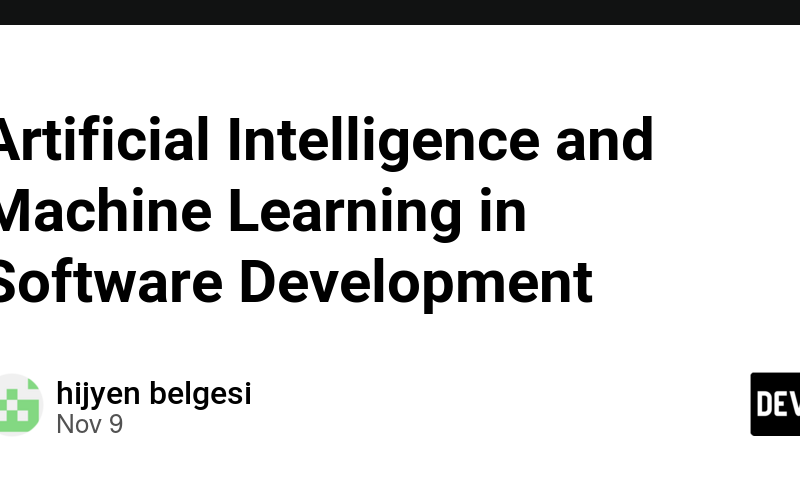In recent years, artificial intelligence (AI) and machine learning (ML) have revolutionized many industries, and software development is no exception. These technologies have opened up new possibilities for creating smarter, more efficient applications that can learn, adapt, and improve over time. In this article, we’ll explore how AI and ML are transforming the software development landscape, the tools available to developers, and the challenges and opportunities these technologies bring.
**1. AI and ML: What Are They?
**Before diving into their applications, let’s quickly review what AI and ML are:
Artificial Intelligence (AI): Refers to the simulation of human intelligence in machines that are programmed to think and act like humans. AI encompasses various fields such as natural language processing (NLP), robotics, computer vision, and more.
Machine Learning (ML): A subset of AI, ML enables systems to learn from data, improve over time, and make predictions without explicit programming. ML models are trained on large datasets and can be used for tasks like classification, regression, clustering, and more.
**2. How AI and ML Are Being Used in Software Development
**2.1 Code Generation and Assistance
AI-powered tools like GitHub Copilot (which is based on OpenAI’s Codex model) have made a significant impact in helping developers write code faster and more efficiently. These tools can:
Autocompletion: Suggest entire lines of code based on a developer’s input.
Code Optimization: Recommend more efficient or concise ways to write certain functions or algorithms.
Error Detection: Spot syntax or logic errors in code and suggest fixes.
2.2 Automated Testing and Bug Fixing
AI and ML are also enhancing the testing phase of software development:
Automated Testing: ML models can be trained to recognize patterns in code and automatically generate test cases. This reduces the manual effort required in testing and speeds up the quality assurance process.
Bug Prediction and Fixing: ML can help identify potential bugs before they occur by analyzing code for known patterns of issues. For instance, tools like DeepCode use machine learning to review code and suggest improvements or identify potential bugs.
2.3 Personalization and Recommendation Systems
In the realm of web development and applications, AI-driven recommendation systems are widespread. Platforms like Netflix, YouTube, and Amazon use machine learning to personalize content for their users. For software developers, integrating such systems into applications is increasingly accessible thanks to libraries and APIs like TensorFlow, PyTorch, and Scikit-learn.
2.4 Natural Language Processing (NLP) for Software Development
Natural language processing allows developers to build software that can understand, interpret, and respond to human language. Some examples of NLP in software development include:
Chatbots and Virtual Assistants: AI-driven conversational agents (like Siri, Alexa, and chatbots in customer service) rely on NLP to communicate with users.
Code Documentation: Some tools use NLP to auto-generate documentation from code, making it easier for developers to maintain and understand large codebases.
**3. AI/ML Tools and Frameworks for Developers
**Several powerful tools and frameworks are available to developers who want to integrate AI and ML into their projects:
TensorFlow: A popular open-source framework for building and deploying machine learning models. It’s widely used for deep learning applications.
PyTorch: Another widely used open-source library for machine learning and artificial intelligence, known for its dynamic computation graph and ease of use in research.
Scikit-learn: A simple and efficient tool for data mining and data analysis, built on Python. It’s great for beginners in machine learning.
Keras: A high-level neural networks API, written in Python, that runs on top of TensorFlow, making it easy to build deep learning models.
**4. Challenges in Implementing AI/ML in Software Development
**While AI and ML offer significant potential, there are some challenges developers should be aware of:
Data Quality and Quantity: ML models require large amounts of high-quality data to be effective. Gathering, cleaning, and labeling data can be time-consuming and expensive.
Complexity and Expertise: Implementing AI and ML solutions requires a deep understanding of algorithms, data science, and the specific problem domain. For developers without expertise in these areas, there may be a steep learning curve.
Model Interpretability: Machine learning models, especially deep learning models, are often seen as “black boxes.” Understanding how and why a model makes certain predictions can be challenging, which is especially problematic in industries where transparency is required (e.g., healthcare or finance).
**5. The Future of AI/ML in Software Development
**As AI and ML continue to evolve, their integration into software development will only become more seamless. The future promises:
Low-code/No-code Tools for AI: Many tools are being developed that allow developers (and even non-developers) to build AI and ML models without writing a single line of code.
Improved Collaboration Tools: AI can help developers collaborate more effectively by automatically suggesting code changes, reviewing pull requests, and even predicting the next steps in development workflows.
Autonomous Software Development: We may see more self-improving software, where AI and ML models help write, test, and deploy code automatically, requiring minimal human intervention.
**6. Conclusion
**AI and machine learning are no longer the future of software development—they are the present. By automating mundane tasks, improving code quality, and enabling new types of applications, these technologies are empowering developers to create smarter, more powerful software. As the field continues to grow, it’s essential for developers to stay updated with the latest tools, techniques, and best practices in AI and ML to remain competitive in the ever-evolving tech landscape.
Source link
lol

